Who’s Who in Regenerating Life
Drona Chetri, Navdanya Program & Communication Head
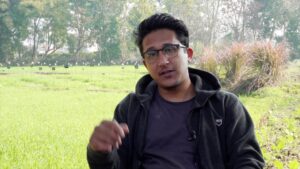
A former youth program coordinator at the GNH Centre of Bhutan, Drona Chetri coordinates educational programming at Navdanya. Their internship program attracts visitors from around the world to learn about agroecology, seed saving, biodiversity conservation, the restoration of forgotten foods, and Earth democracy.
Cynthia Daley, Co-Director, Center for Regenerative Agriculture & Resilient Systems, California State Univ. Chico
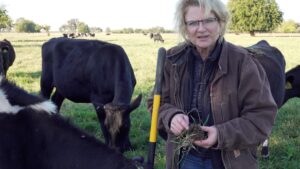
Born into a four-generation midwestern farming family Cynthia Daley is a professor within the College of Agriculture at California State University, Chico, where she directs the Organic Dairy Program (ODP) and is a professor for Environmental Literacy. She worked with a group of progressive organic dairy farmers to create the Western Organic Dairy Producers Alliance. The Center for Regenerative Agriculture represents an interdisciplinary team of faculty and farmers who recognize the ecological benefits of regenerative farming practices.
Willy Denner, Little Seed Gardens
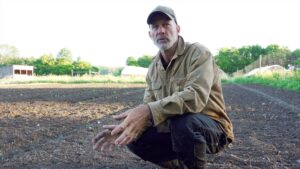
Farmers Willy Denner and Claudia Kenny established Little Seed Gardens in 1995. It is a 97-acre family farm in Chatham, NY where they tend vegetables, cover crops, livestock and pastures. Little Seed grows and shares food in ways that strengthen the living communities we are part of. Little Seed Gardens is certified organic by NOFA-NY and the REAL Organic Project.
Rubén Duro Pérez, Science into Image
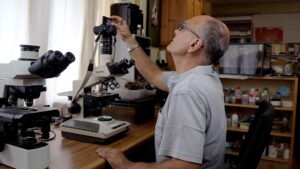
Rubén Duro is a biologist, science communicator, photographer and independent producer of science and natural history documentaries and the founder of the Science into Images project. His images have appeared in scientific journals and popular science magazines (Symbiosis, International Microbiology, Contributions to Science, PLoS ONE, National Geographic, Investigación y Ciencia and Muy Interesante) and were included in the exhibition Microlife. Beyond the Human Eye (CosmoCaixa, 2012) and Science Friction: Living Among Companion Species (2021). His photography of the microbiological world was included in Symbiotic Earth (2017)
Gail Fuller, Fuller Farms
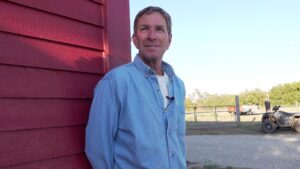
Gail Fuller is a third generation Kansas farmer who has spent the last 30 years converting his farming practices to a regenerative and holistic management model. In 2012, Fuller and Lynette Miller founded the Fuller Field School which is in Gail’s words “a deep dive into the water, carbon, and mineral cycles, energy flow, and how they relate with soil and animal (human) health.” The Field School holds intensive sessions with hands-on workshops led by visiting farmers, scientists and educators.
Tom Goreau, President, Global Coral Reef Alliance
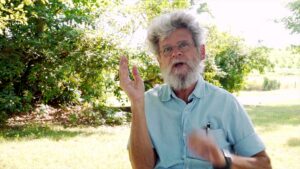
Biogeochemist and marine biologist Tom Goreau researches impacts of climate change, pollution and new disease in coral reefs across the Caribbean, Indian Ocean and Pacific. His focus is on coral reef restoration, shoreline protection, soil metabolism, among other things. He was formerly Senior Scientific Affairs Officer at the UN Centre for Science and Technology for Development and is Director of Remineralize The Earth.
Stephan Harding, Schumacher College
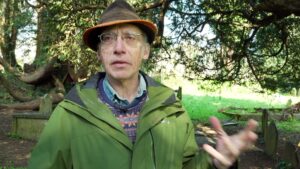
Stephan Harding is a pioneering Earth scientist who focuses on deep ecology and the theory of Gaia. Harding is co-founder and Head of Holistic Science at Schumacher College. He has been the College’s resident ecologist and tutor since 1991. He has a doctorate in behavioral science from the University of Oxford, and is the author of Animate Earth: Science, Intuition and Gaia (2006) and Gaia Alchemy (2021) among others.
Wes Jackson, The Land Institute
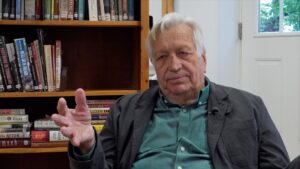
Co-founder and president emeritus of The Land Institute in Salinas, Kansas, Wes Jackson has been a leader in the sustainable agriculture movement since the 1970s. In 1978, he proposed the development of an agriculture based in perennial polyculture. The Land Institute is working to develop perennial grains, pulses, and oilseed-bearing plants to be grown in ecologically intensified, diverse crop mixtures. Jackson has a PhD in Genetics from NC State University and a Masters in Botany from the University of Kansas. He is author of many articles and books on sustainable agriculture including Becoming Native to This Place (1994). In 2000, he received the Right Livelihood Award.
Walter Jehne, Regenerate Earth, Ltd.
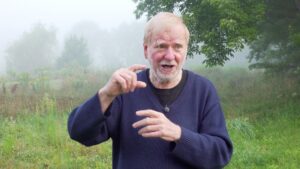
Walter Jehne is an Australian soil microbiologist and climate scientist and the founder of Healthy Soils Australia, Regenerate Earth, and the Rehydrate California Initiative. He educates farmers, policymakers and others about “the soil carbon sponge” and its crucial role in reversing and mitigating climate change. Jehne investigated the potential of mycorrhizal fungi to recolonize toxic, degraded soils and to rebuild productive biosystems and worked with the Australian federal government on changing the paradigm of land management to foster strategic innovation. In 2017, he participated in an invitation-only UN Food and Agriculture Organization conference in Paris aimed at bringing soil into the next Intergovernmental Panel on Climate Change (IPCC) report. He is a scientific consultant for large-scale regeneration efforts, including the UN FAO Farmer Field School Programme, and the Andhra Pradesh Community-Managed Natural Farming initiative (APCNF) in India.
Claudia Kenny, Little Seed Gardens
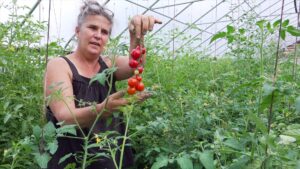
Claudia Kenny has over 20 years of experience as a farmer and food system activist. She and her husband Willy Denner own and operate Little Seed Gardens farm in Chatham, NY which practices Holistic Management. Holding a Masters degree in Conflict Resolution with a concentration in environmental conflict, she is Statewide Director of NYS Agricultural Mediation Program and is a graduate of LEAD, NY, an intensive Agricultural Leadership Program of Cornell.
Robyn Mast King, Jako Farm
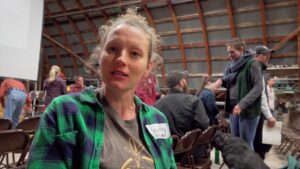
Robyn Mast King and her husband Daniel King manage Jako Farm near Hutchinson, Kansas. Daniel’s family has owned the farm since 1921 and today the farm markets grass-fed beef, lamb, pork, and chicken, a variety of raw dairy products, raw honey, tallow-based skin care products, and seasonal produce. They educate their community and fellow farmers through one-on-one coaching and community events like the “Stand Up for Soil” picnic.
Dan Kittredge, Executive Director, Bionutrient Food Association
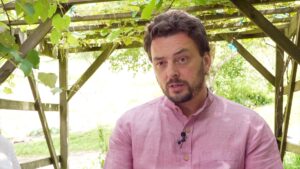
Dan has been an organic farmer for more than 30 years. He grew up on Many Hands Organic Farm in central Massachusetts with his parents, Julie Rawson, NOFA-MA Executive Director, and Jack Kittredge, publisher of Natural Farmer. After working globally in the late 90s and early 2000s with farmers, NGOs, and researchers across India, Russia, and Central America, Dan returned to the U.S. and in 2010 launched the Bionutrient Food Association (BFA) in order to ignite a movement around food quality.
Molley Knight, Little Seed Gardens
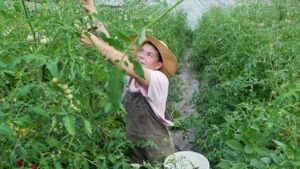
Molley Knight is a farmer who has worked at Little Seed Farms for many years starting in her teen years as an intern.
Satish Kumar, Resurgence Trust
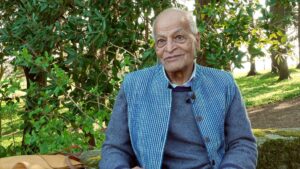
Life-long activist, pacifist, and former Jain monk, Satish Kumar has devoted his life to campaigning for ecological regeneration, social justice, and spiritual fulfilment. He founded The Resurgence Trust, an educational charity, and was editor of the charity’s magazine, Resurgence & Ecologist, for over 40 years. He is the co-founder and Director of Programmes of the Schumacher College, an international center for ecological studies. He has written countless articles and books including The Buddha and the Terrorist (2006) and No Destination: Autobiography of a Pilgrim (2014).
M.L. Bhairava Kumar, Natural Farming Fellow, ZBNF
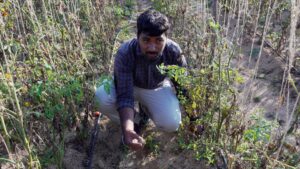
M.L. Bhairava Kumar is a master farmer with the Zero Budget Natural Farming (ZBNF) program in Andhra Pradesh India. Master farmers are trained in organic and ecological farming practices and then work with a network of small farms sharing these practices. ZBNF, which has been renamed the Andhra Pradesh Community-Managed Natural Farming initiative (APCNF), is working with over 750,000 farmers.
Vijay Kumar, Executive Vice Chairman, Rythu Sadhikara Samstha (RySS), Govt of Andhra Pradesh
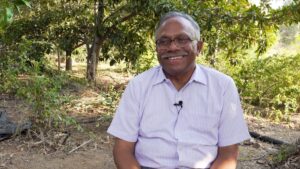
Vijay Kumar is Executive Vice Chairman of the Indian non-profit Rythu Sadhikara Samstha, which focuses on organic agriculture. He is an advisor on agriculture and cooperation to the state government of Andhra Pradesh. For ten years he was CEO of the Society for Elimination of Rural Poverty in Andhra Pradesh which helped 11.5 million rural women create self-help groups and move out of poverty. During the past five years, he has led a movement for climate-resilient, community managed natural farming, also known as Zero Budget Natural Farming. In 2020, it was renamed Andhra Pradesh Community-Managed Natural Farming. He was appointed as the Vice Chair (Productions) of the Champions Network for the UN Food Systems Summit (September 2021).
Jim Laurie, Restoration Biologist
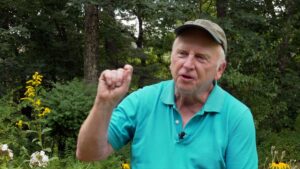
Jim Laurie is a restoration biologist and co-founder of Biodiversity for a Livable Climate. He has been learning how to restore lands and waters for 30 years and was the manager of the Vermont “Living Machine” which treated 80,000 gallons of sewage per day and was designed by ecological visionary John Todd. For 20 years he was a biologist and technical trainer in the chemical industry in Houston, TX, where his work with ecological systems created high quality water from toxic wastewater. Laurie studied Holistic Management of grasslands with Allan Savory and the Savory Institute. He built a lab in Maryland to study fungi and grow mushrooms learning from the work of Paul Stamets (fungi.com).
Leah Penniman, Soul Fire Farm
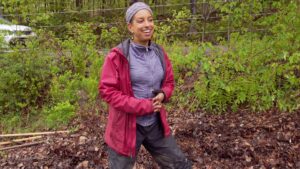
Leah Penniman is a farmer, educator, food sovereignty activist, and author of Farming While Black (2018) and Black Earth Wisdom: Soulful Conversations with Black Environmentalists (2023). She is co-founder, co-director and program manager of Soul Fire Farm in Grafton, NY whose mission it is to end racism and injustice in the food system by reclaiming the inherent right to belong to the earth and have agency in the food system as Black and Brown people. Soul Fire Farm facilitates many programs, including farmer training for Black & Brown people and a subsidized farm food distribution program for communities living under food apartheid.
Naima Penniman, Soul Fire Farm
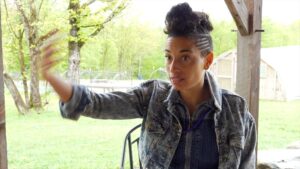
Naima Penniman is a multi-dimensional artist, activist, healer, grower, and educator committed to planetary health and community resilience. She is the Program Director at Soul Fire Farm, where she supports the next generation of Black, Brown and Indigenous farmers with the skills needed to reclaim leadership in the food system. She is the co-founder of WILDSEED, a BIPOC-led, land-based community focused on ecological collaboration, transformative justice, and intergenerational responsibility. Her poetry is published in All We Can Save, We Are Each Other’s Harvest, Farming While Black, and Semillas.
Didi Pershouse, Lands & Leadership Initiative
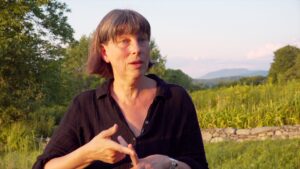
Didi Pershouse is founder and lead educator for the Lands & Leadership Initiative (LALI) and coordinator, researcher and writer for Seed Media Project. The LALI provides strategic support and workshops to engage farmers, ranchers, policy makers, investors, and scientists in living-systems thinking and deep listening to address society’s major challenges—food, water, climate, conflict, and health. She is the author of The Ecology of Care (2015) and founder of the Center for Sustainable Medicine. After 22 years of clinical work with patients, Pershouse now travels as a speaker, teacher, and consultant. She was one of five speakers at the 2017 UN-FAL World Soil Day.
Gerald Pollack, Professor, University of Washington
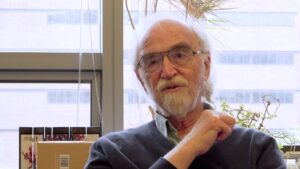
Gerald Pollack is professor of bioengineering at the University of Washington, where he maintains an active laboratory. He has developed a revolutionary new theory of water, which he describes in his book The Fourth Phase of Water (2013) He is founding Editor-in-Chief of the research journal WATER: A Multidisciplinary Research Journal, Executive Director of the Institute for Venture Science, and founder of the Annual Conference on the Physics, Chemistry, and Biology of Water. He has received numerous honors including the Prigogine Medal for Thermodynamics, the NIH Director’s Transformative Research Award, and the 1st Emoto Peace Prize.
Adam Sacks, Executive Director Emeritus, Biodiversity for a Livable Climate
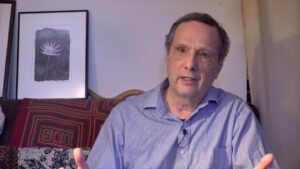
Adam Sacks is the founder and former Executive Director of Biodiversity for a Livable Climate. He has had careers in education, holistic medicine, computer technology, politics, and advocacy. For five years he directed a non-profit that worked with communities to counter detrimental local corporate activity. He has been a climate activist since 1999 and has been studying and writing about Holistic Management since 20007. He holds and Ed.D. from the University of Massachusetts and an N.D. (Naturopathic Doctor) from Bastyr University. On the side he is an artist and writer.
Steffen Schneider, Institute for Mindful Agriculture
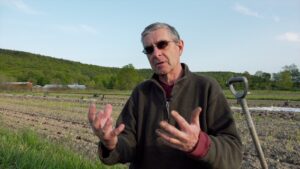
Steffen Schneider has over three decades of experience as a biodynamic farmer and herdsman. Currently he is the Director Emeritus of Farming Operations at Hawthorne Valley Farm. He holds a masters degree in agriculture from the Justus Von Liebig University in Giessen, Germany. Since 2007 he has been on the Board of Directors of the Biodynamic Association of North America, having served as President, Treasurer and Vice-President. Steffen has keynoted biodynamic conferences in the US, Switzerland and New Zealand and conducted workshops at organic and biodynamic conferences in the US, China, Switzerland, and New Zealand.
Vandana Shiva, Navdanya
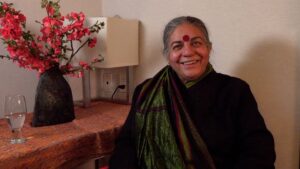
Vandana Shiva, a world-renowned environmental thinker, activist, feminist, philosopher of science, writer, and science policy advocate, is the founder of Navdanya Research Foundation for Science, Technology and Ecology (India) and President of Navdanya International. After receiving a Ph.D. with a focus on Quantum Theory, she shifted to inter-disciplinary research in science, technology and environmental policy. In 1982 she founded the Research Foundation for Science, Technology and Ecology (RFSTE), and two years later, Navdanya (‘nine seeds’) the movement in defense of biodiversity and small farmers. She is co-founder and Chairman of the International Commission on the Future of Food and Agriculture. She is recipient of many awards, including in 1993 the Right Livelihood Award. She is a prolific writer and author of numerous books including Stolen Harvest (2000) and Who Really Feeds the World (2016).
Lisa Stokke, Founder, Next 7 Project
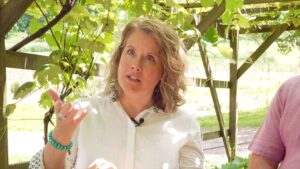
Lisa Stokke is the founder and Executive Director of Next 7, a grassroots organization that brings people together to advocate ideas that benefit the next 7 generations. In 2008 she co-founded Food Democracy Now!, a nonprofit organization of 750,000 members where for 9 years she advocated for organic and regenerative agriculture. Next 7 was launched in 2017 with the Protect Organic campaign to preserve the integrity of the Organic label. In 2018, Lisa began to work with Bionutrient Food Association where she now serves as Communications director and Strategist.
Yapmaan Swetha, Natural Farming Fellow, ZBNF
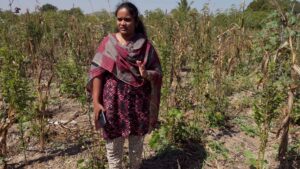
Yapmaan Swetha is a Master Farmer with the Zero Natural Farming program in Andhra Pradesh, India. She acted as a translator for filmmaker John Feldman during his visit to film farmers and their work as part of the ZBNF project in Andhra Pradesh for the documentary Regenerating Life.
Karen Washington, farmer/activist; Co-owner Rise&Root Farm
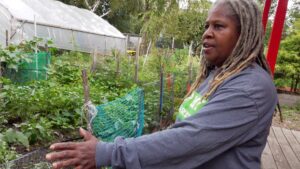
Since retiring as a physical therapist in 2014, Karen Washington has been a co-owner and organic grower of Rise & Root Farm in Chester, NY. As a board member of the New York Botanical Gardens, Washington worked with Bronx neighborhoods to turn empty lots into community gardens. In 1988, she co-founded The Garden of Happiness, a community garden in The Bronx. She is former president of the New York Community Garden Coalition and co-founder of La Familia Verde Garden Coalition, which launched a City Farms Market. In 2010, she co-founded Black Urban Growers (BUGS) an organization supporting Black growers in urban and rural settings. She has received multiple awards, including the James Beard Leadership Award in 2014 and the James Beard Humanitarian Award in 2023.
Other Important People
Berta Caceres
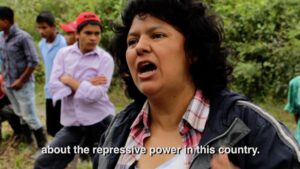
Berta Cáceres (1971-2016) was an environmental activist and indigenous leader of the Lenca people of Honduras. In 1993, she co-founded the Council of Popular and Indigenous Organizations of Honduras (COPINH), which led the Lenca people in peaceful opposition to the construction of the Agua Zarca hydroelectric dams on the sacred Gualcarque River. The dam was being funded by the Chinese company Sinohydro, the World Bank, the International Finance Corporation, and the Honduran company Desarrollos Energéticos (DESA). COPINH was successful in stopping the construction but was violently attacked by security militias and Honduran armed forces. In 2013, Berta’s comrade Tomas García was murdered. Because of COPINH’s resistance and the outcry against the violence, Sinohydro withdrew from the deal with DESA and IFC revoked their funding. After years of threats on her life, Berta Cacéres was murdered in her home on March 3, 2016. Twelve days later another COPINH member Nelson García was murdered. Cáceres’ daughters and COPINH mobilized with lawyers to obtain justice. In 2021 nine men, included Roberto David Castillo, the former president of DESA, were found guilty and sentenced to long prison terms for the murder of Cáceres. COPINH continues to fight for justice for Berta Cacéres and to protect the rights of the Lenca people.
Anastassia Makarieva
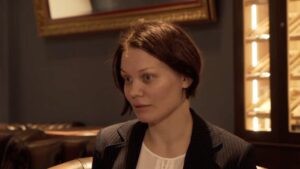
Anastassia Makarieva is a physicist at the Theoretical Physics Division of Petersburg Nuclear Physics Institute (PNPI). She and her mentor and colleague Victor Gorshkov, developed the biotic pump theory which explains how Russia’s boreal forest, the largest forest on Earth, regulates the climate of northern Asia. Makarieva graduated from Leningrad Polytechnic Institute, Faculty of Physics and Mechanics, in 1996 and obtained her PhD in atmospheric physics from St. Petersburg State University in 2000.
In 2007 in co-authorship with V.G. Gorshkov, Makarieva published a paper in Hydrology and Earth System Sciences presenting the concept of the biotic pump of atmospheric moisture highlighting key ecological feedbacks on atmospheric moisture transport. Combining theoretical work with field observations, Makarieva spent over sixty months doing forest research in the Russian wilderness. Every summer, she spends time in the forest camping on the shores of the White Sea – “The forests are a big part of my inner life,” she says.
Lynn Margulis
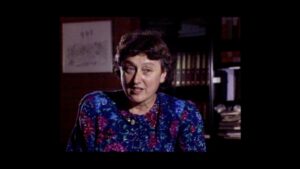
Lynn Margulis (1938-2011) was a geoscientist, evolutionary theorist, biologist, author, and one of the most important thinkers of the past 60 years.
One of her most significant achievements was the development of a new evolutionary theory, symbiogenesis, which was introduced with her 1967 groundbreaking paper “On the Origin of Mitosing Cells”. She transformed our current understanding of the evolution of cells with nuclei by proposing it to have been the result of a series of symbiotic mergers with bacteria. By promoting the idea of symbiosis in evolution, Margulis challenged the prevailing views of the neo-Darwinists whose theories were based on the concept of the “Selfish Gene” and nature as “red in tooth and claw.”
Margulis also co-developed the Gaia hypothesis with the British scientist James Lovelock proposing that the Earth functions as a self-regulating system, based on symbiotic inter-relationships. Margulis wrote many important books, some in collaboration with her son, Dorion Sagan. John Feldman’s film Symbiotic Earth is an exploration of the work of Margulis and her colleagues.
Tony Rinaudo
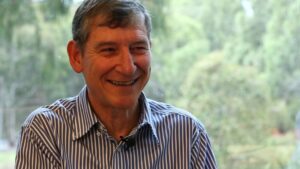
Tony Rinaudo is an agronomist who served as an agriculturalist and missionary in Niger Republic from 1981 to 1999. He oversaw rural development and relief programs for the Maradi Integrated Development Project with the Sudan Interior Mission (now known as SIM) in the Sahel region of Niger. When tree-planting efforts failed, he found that there were tree root systems underground which were still alive. By pruning and managing tree shoots, he and local farmers were able to get the “underground forest” to grow into trees. His technique is called Farmer Managed Natural Regeneration (FMNR) and helped transform millions of hectares of dry land. This earned him the title “The Forest Maker.” For his 18 years’ service, the government of Niger awarded him “The Order of Agriculture with Merit” (Merite Agricole du Niger). RInaudo joined World Vision Australia in 1999 where he oversees land regeneration projects worldwide. In 2022, The Forestmaker, a documentary film portrait of Rinaudo directed by Volker Schlöndorf was released.
